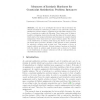Free Online Productivity Tools
i2Speak
i2Symbol
i2OCR
iTex2Img
iWeb2Print
iWeb2Shot
i2Type
iPdf2Split
iPdf2Merge
i2Bopomofo
i2Arabic
i2Style
i2Image
i2PDF
iLatex2Rtf
Sci2ools
SOFSEM
2004
Springer
2004
Springer
Measures of Intrinsic Hardness for Constraint Satisfaction Problem Instances
Our aim is to investigate the factors which determine the intrinsic hardness of constructing a solution to any particular constraint satisfaction problem instance, regardless of the algorithm employed. The line of reasoning is roughly the following: There exists a set of distinct, possibly overlapping, trajectories through the states of the search space, which start at the unique initial state and terminate at complete feasible assignments. These trajectories are named solution paths. The entropy of the distribution of solution paths among the states of each level of the search space provides a measure of the amount of choice available for selecting a solution path at that level. This measure of choice is named solution path diversity. Intrinsic instance hardness is identified with the deficit in solution path diversity and is shown to be linked to the distribution of instance solutions as well as constrainedness, an established hardness measure.
Search Space | SOFSEM 2004 | Solution Path | Solution Path Diversity | Theoretical Computer Science |
Related Content
| Added | 02 Jul 2010 |
| Updated | 02 Jul 2010 |
| Type | Conference |
| Year | 2004 |
| Where | SOFSEM |
| Authors | George Boukeas, Constantinos Halatsis, Vassilis Zissimopoulos, Panagiotis Stamatopoulos |
Comments (0)

